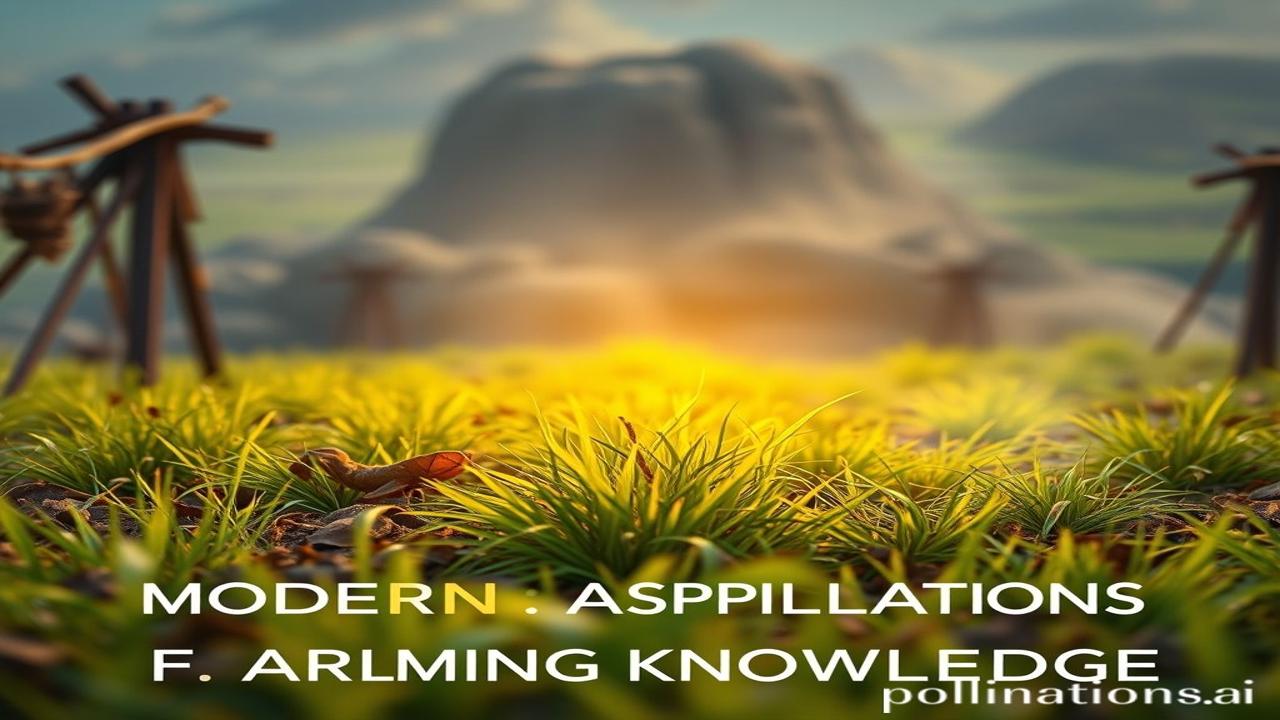Waqt Ke Dhol Mein, Mitti Ki Siyasat: Modern Applications of Ancient Farming Knowledge
Kabhi socha hai, dharti maa ne apne aanchal mein kitne raaz chhupaye hain? Woh raaz, jo aaj bhi hamari kheti-badi ko roshan kar sakte hain. Imagine, ek seedha-saadha kisan apne bailon se zameen jot raha hai, bilkul jaise uske pitaji ne kiya tha, aur unke pitaji ne, aur usse bhi pehle. Magar kya woh jaanta hai ki uske haathon mein jo mitti hai, usme chhupi hai 5000 saal se zyada purani wisdom, ek aisi samajh jo aaj hum modern technology se rediscover karne ki koshish kar rahe hain?
Indus Valley Civilization Se Aaj Tak: Ek Nazar
Ancient farming knowledge, yeh sirf purani kitabon ya museums mein hi nahi, balki hamari DNA mein bhi encoded hai. We’re talking about techniques developed during the Indus Valley Civilization (3300-1700 BCE) and refined through the Vedic period (1500-500 BCE) and beyond. Yeh ‘knowledge’ kya hai? It includes things like:
- Crop rotation: Different faslon ko ek hi zameen par badal-badal kar lagana, jisse mitti ki upjau shakti bani rahe.
- Water management: Baarish ke paani ko jama karna (water harvesting) aur usko efficiently use karna.
- Natural pest control: Neem, tulsi, aur aisi hi jadi-butiyon se keede-makodo ko bhagana.
- Mixed cropping: Ek saath kai tarah ke fasal lagana, jisse risk kam ho aur yield badhe.
Yeh techniques important kyu hain? Because they helped sustain civilizations for thousands of years! They were sustainable, eco-friendly, and deeply rooted in the understanding of nature’s rhythms.
Kisan, Raja, Aur Prakriti: Zindagi Ki Kahani
Imagine Raja Janak, ek philosopher-king, khud apne kheton mein hal chala rahe hain. Yeh sirf ek kahani nahi hai; it reflects the importance placed on agriculture and manual labor in ancient Indian society. Ab socho, ek kisan, Ramu kaka, apne kheton mein subah se shaam tak kaam kar rahe hain. Unke paas koi fancy tractor nahi hai, but he understands the cycles of the monsoon better than any meteorologist.
- Dialogue: “Arre Beta,” Ramu kaka kehte hain, “Yeh mitti bolti hai. Tumko bas sunna aana chahiye.”
Ma Rukmini, unki patni, tulsi ke paudhe ke aas-paas mitti mein neem ki pattiya mila rahi hain, taaki keede dur rahein. Yeh koi random act nahi hai; it’s a time-tested method of organic pest control.
Dharaohar Aur Pehchaan: Modern Avatar
Aaj, jab hum climate change, food security, aur sustainable agriculture ki baatein karte hain, we’re essentially trying to reinvent the wheel. The solutions we seek are often found in the very practices our ancestors used.
- Organic Farming: Many farmers are now adopting organic farming methods, which are based on the principles of ancient agricultural practices.
- Water Conservation: Techniques like rainwater harvesting and traditional irrigation systems are being revived to combat water scarcity.
- Seed Banks: Community-based seed banks are preserving indigenous crop varieties, ensuring biodiversity and resilience.
Yeh sab “Bharatiyata” ka ek important hissa hai – it’s a recognition that we have a treasure trove of wisdom within our own culture. We don’t need to blindly follow Western models; we can draw inspiration from our own heritage to create a more sustainable and equitable future.
Mazedaar Tathya Ya Bhram-Bhanjak
Log samajhte hain ki “modern farming” hamesha “better” hoti hai. Lekin asli sach yeh hai ki modern farming often relies heavily on chemical fertilizers and pesticides, which can harm the environment and human health. Ancient farming practices, on the other hand, are inherently sustainable and promote biodiversity.
Also, did you know that the concept of “zero-budget natural farming” (ZBNF), which is gaining popularity in India, is based on ancient agricultural principles? It emphasizes using natural inputs and reducing the reliance on external resources.
Drishya Aur Bhavnaayein
The air smells like damp earth and ripening mangoes after a good rain. The temple walls, cool to the touch, bear witness to centuries of agricultural rituals and festivals. The sound of bullock carts creaking along dusty roads is a reminder of a simpler, more connected way of life.
Imagine the taste of fresh, organically grown vegetables – they taste different, more alive! This is the power of ancient farming knowledge, bringing us closer to nature and nourishing our bodies and souls.
Antim Vichar Ya Uddharan
“Vasudhaiva Kutumbakam” – The world is one family. Ancient farming knowledge reminds us that we are all interconnected and that our actions have consequences for the entire planet. Let us learn from our ancestors and cultivate a future that is both prosperous and sustainable.
- Poetic Line: “Mitti se jude toh, zindagi se jude.”
